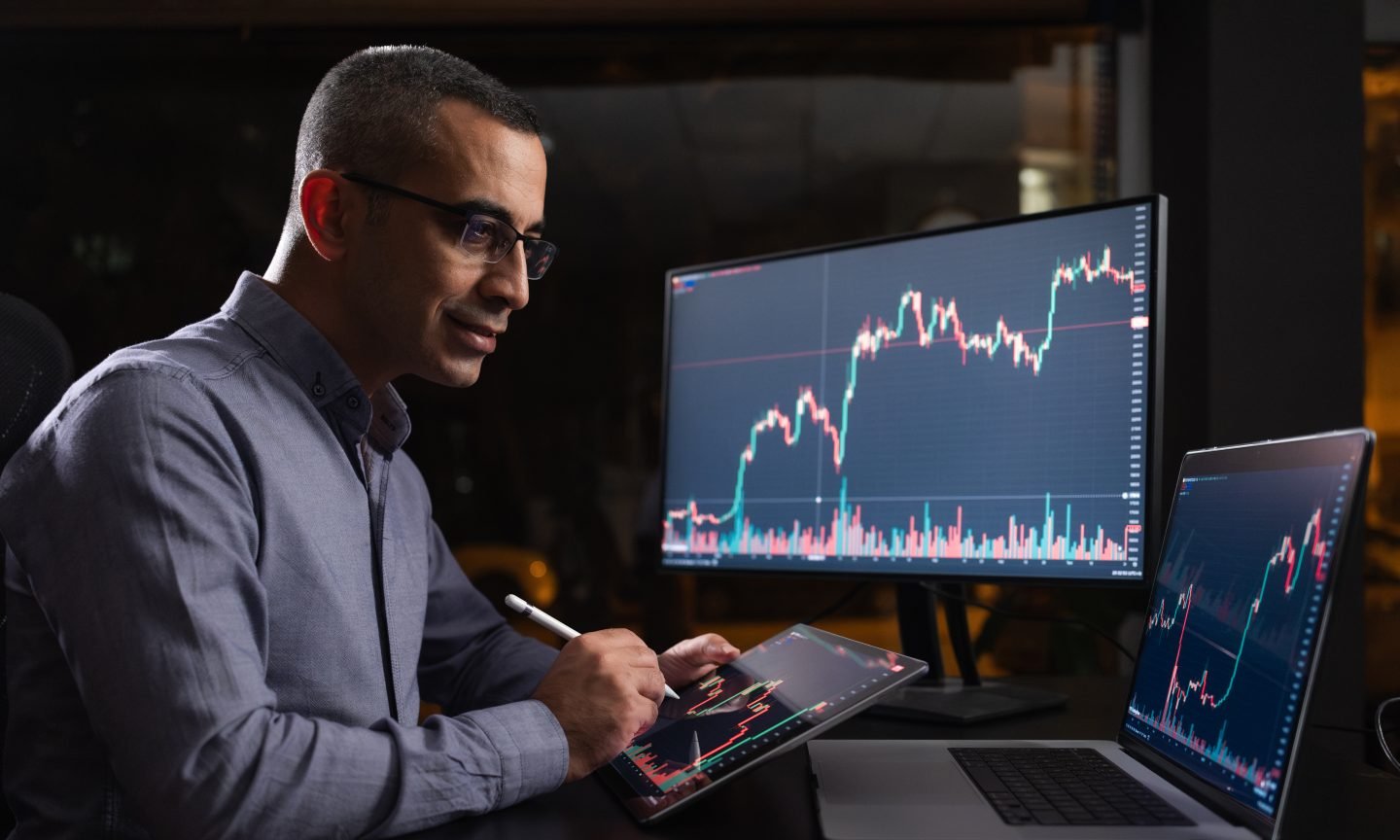[ad_1]
If you write concerning the inventory market and the economic system, you get lots of hate mail. It’s simply a part of the job—tempers are inclined to fray when cash is on the road and massive names specific their, at instances controversial, opinions. However over the previous yr, even with inflation fading and shares rebounding, I’ve acquired a distinct kind of correspondence from Fortune readers.
Merely put, they’re fearful.
Ominous headwinds going through the U.S. economic system and inventory market, from rising private and non-private money owed to industrial actual property woes, even left one plaintive reader asking: “How can I—as a median American and retail investor—shield my portfolio?”
To reply that query, reader, I reached out to one of many brightest minds on Wall Avenue. However I didn’t search for an everlasting optimist to assuage your fears, leaving you burying your head within the sand and merely hoping for the very best. As an alternative, I discovered a person identified for constantly and meticulously making ready for (however not essentially predicting) the subsequent financial disaster: Mark Spitznagel, the founder and chief funding officer of the non-public hedge fund Universa Investments.
Spitznagel’s agency is devoted to tail-risk hedging, a method that seeks to forestall losses from unforeseeable and unlikely financial catastrophes like wars or pandemics by buying insurance-like spinoff contracts. The identify, tail-risk hedging, is a reference to the thin left tail of a bell curve (regular) distribution of outcomes, the place actually unlikely, however actually unhealthy, issues occur. These are known as, extra proverbially, black-swan occasions, and Spitznagel has an extended historical past with Nassim Taleb, who coined the well-known monetary phrase.
“Nassim and I formulated the nuts and bolts of this common concept 25 years in the past. We had been the primary formal tail-risk hedge fund,” Spitznagel instructed Fortune. “We simply bounced concepts off one another, we nonetheless do to this present day. He’s been an enormous a part of the considering behind the expansion of this.”
Taleb and Spitznagel’s repeated success utilizing this considerably controversial tactic is detailed in Wall Avenue Journal reporter Scott Patterson’s new guide, Chaos Kings, together with the billions Universa earned from its crash safety through the International Monetary Disaster of 2008.
I hoped that Spitznagel would assist me discover a easy but sensible answer to guard your portfolio from worst-case eventualities (or tail dangers)—in spite of everything, that’s his “bread and butter.” However his reply wasn’t what I anticipated.
If you ask the person who has written a number of books on danger mitigation—his newest is named Protected Haven: Investing for Monetary Storms—how retail traders can shield their capital, you anticipate to listen to just a few of the standard choices: gold, Treasurys, or perhaps the Swiss Franc.
As an alternative of all that, Spitznagel warned that in relation to safe-haven investing, “the remedy is commonly worse than the illness.” If danger mitigation isn’t value efficient and supportive of upper total returns in the long run, then it’s not value it. In his view, many of the traditional safe-haven methods utilized by retail traders fall into this class.
There’s some excellent news, nonetheless. A recession or market downturn might come—and Spitznagel says he’s fearful about what he calls the “best credit score bubble in human historical past” and a “tinderbox” economic system—however maybe paradoxically, he doesn’t anticipate even that to be the tip of the world for retail traders centered on constructing wealth for the longer term. It could take time, he stated, however markets all the time recuperate, even from surprising, economy-crushing black swan occasions.
Regardless of the potential for financial catastrophe, Spitznagel believes that retail traders ought to most likely simply take heed to the timeless recommendation of Berkshire Hathaway chairman Warren Buffett: Give attention to the lengthy haul and don’t wager in opposition to America.
You must like to lose
Most 16-year-old boys spend their days chasing women and discovering methods to get into bother, however life has all the time been a bit totally different for Spitznagel. In highschool, he turned an apprentice to a veteran corn and soybean dealer often known as the “Babe Ruth of the Chicago Board of Commerce,” Everett Klipp. “He was like a grandfather to me,” Spitznagel stated of Klipp. “Actually one of many best folks that I’ve ever identified. Assembly him once I was nonetheless only a child was my optimistic black swan occasion.”
Klipp was born on an Illinois dairy farm within the Nice Melancholy and served within the Navy throughout World Warfare II. Recognized for mentoring dozens of up-and-comers all through his 50-year profession, he taught a younger Spitznagel concerning the significance of disciplined buying and selling at an age when most of us had been extra fearful about what we had been going to put on to promenade.
“His enthusiasm for buying and selling and the open outcry markets in Chicago was contagious,” Spitznagel stated, recalling a few of Klipp’s favourite sayings, together with the signal that sat on the entrance to his agency: “Have an perspective of gratitude!”
For Klipp, who died in 2011, a merchants’ job wasn’t to make prescient market forecasts, it was to revenue. That meant taking a small loss and transferring on to the subsequent commerce was typically a much better choice than shedding all of it in an surprising market swing.
Spitznagel stated that Klipp’s self-described “like to lose” technique and unwillingness to depend on forecasts is on the root of the whole lot he does right this moment. Universa, which managed over $16.4 billion as of the tip of the primary quarter, focuses on a risk-mitigation technique that includes taking small, regular losses for lengthy intervals to be able to buy insurance coverage that pays handsomely throughout a inventory market crash.
One other adherent to this philosophy, after all, is the monetary mathematician and best-selling creator Taleb, who has all the time confused the significance of making ready for the worst and serves as Universa’s “distinguished scientific adviser.”
In his 2010 guide, The Black Swan, Taleb describes the influence of unusual and unpredictable outlier occasions on economies and markets. It’s a principle that Spitznagel stated has been “very instrumental” to his personal investing philosophy.
The pair met in 1999, when Spitznagel took a break from buying and selling on the Chicago choices change and enrolled in a masters program for mathematical finance at New York College. Taleb, then an adjunct professor at NYU’s Courant Institute of Mathematical Sciences, turned Spitznagel’s instructor and the 2 shortly turned pals and collaborators.
Spitznagel would go on to discovered Universa in 2007, and with Taleb’s assist, develop the agency’s now well-known tail-risk hedging technique, which, as beforehand mentioned, depends on making explosive good points throughout critical market downturns by insurance-like choices methods, even when it means taking small losses to afford the insurance coverage when instances are good.
Spitznagel’s flagship fund, the “Black Swan Safety Protocol,” for instance, made headlines when it profited from the COVID-induced downturn of 2020, with reporters latching onto a 4,144% return determine listed in a leaked letter to traders. The seemingly outlandish quantity led to criticism from a number of hedge-fund friends, together with Citadel’s former world head of mounted revenue, Derek Kaufman, who instructed Bloomberg earlier this yr that Universa’s returns had been most likely “too good to be true.”
However Spitznagel clarified that the 4,144% return was derived not from the fund’s complete portfolio, however from the hedges (suppose: the insurance coverage coverage) that had been acquired to revenue throughout market downturns. It was an instance of his explosive tail danger safety technique in operation, not a declare that his fund was returning over 4,000% per yr to traders. Fortune was capable of independently confirm this declare after viewing the letter.
“I do hate that folks suppose that we’re shrouded in thriller greater than we must be,” Spitznagel stated. “These numbers are coming from a letter I wrote to my shoppers, all of whom have full transparency into their capital accounts. What do they suppose I’m getting away with?”
Universa is a personal hedge fund, so it’s not required to reveal its whole portfolio returns—and Spitznagel declined to offer more moderen return statistics to Fortune—however in line with figures audited by EY, it posted a 105% life-to-date common annual return on invested capital between January 1, 2008, and December 31, 2019.
These are spectacular numbers, however there’s an issue for retail traders. This technique—shopping for insurance-like safety in opposition to market crashes—is sort of not possible to tug off constantly. That’s why, regardless that Spitznagel is fearful about the way forward for the inventory market, he additionally says he doesn’t consider retail traders ought to strive buying and selling choices or inserting any type of wager in opposition to the market. That’s finest left to the professionals.
The best credit score bubble in human historical past
Spitznagel doesn’t prefer to make predictions, as a result of his fund is all the time ready for a downturn, however the actuality is, the hedge-funder hasn’t all the time shied away from forecasting. In 2013, he instructed Fortune that the inventory market may lose 40% of its worth in a coming crash. The decision turned out to be a bit untimely, at finest, because the 2010s noticed a “jobless restoration” that became one of many longest financial expansions in American historical past. However lately, Spitznagel continues to be fearful concerning the economic system, citing rising private and non-private money owed as a key concern.
“We’re within the best credit score bubble in human historical past. And that’s not my opinion, that’s simply numbers,” he stated. “There isn’t a query about the truth that we live in an age of leverage, an age of credit score, and it’ll have its penalties.”
To his level, whole U.S. family debt hit a file $17 trillion within the first quarter, New York Fed knowledge reveals. And world public debt surged to an all-time excessive of $92 trillion final yr, a 400% enhance since 2000, in line with a United Nations report launched this month.
On high of that, authorities debt-to-GDP ratios have been steadily climbing for many years worldwide. Within the U.S., the entire public debt-to-GDP ratio hit 118% within the first quarter, in line with Federal Reserve knowledge.
Spitznagel believes the rising curiosity expense on federal authorities money owed will finally constrain fiscal spending, gradual financial development, and drive central banks to maintain rates of interest decrease than many now forecast. He pointed to the truth that internet curiosity funds on U.S. authorities debt are estimated to whole $395.5 billion this fiscal yr, or 6.8% of all the 2023 federal funds, in line with the Workplace of Administration and Finances.
Backing up his view, the U.S.’s rising federal funds deficit and an “erosion of governance” led Fitch Rankings to downgrade the U.S. authorities credit standing this week to AA+, from its top-tier AAA score. And one other hedge fund titan, the billionaire Ray Dalio, sounded the same tune concerning the authorities’s stability sheet in a publication posted to his LinkedIn on Wednesday.
Rising private and non-private money owed are a serious subject, however the Fed can also be responsible for creating an financial “tinderbox,” in line with Spitznagel. The hedge-funder equated the Fed’s interventionist insurance policies because the International Monetary Disaster—together with its resolution to slash rates of interest to close zero and purchase authorities bonds and mortgage-backed securities (a coverage known as quantitative easing or just “QE”) throughout COVID—to firefighters mismanaging a wilderness space. When smaller forest fires aren’t allowed to burn away extra vegetation, it might probably result in even larger, extra uncontrollable fires down the highway.
Equally, by not permitting the economic system to fall into recession (i.e., face a small fireplace) by using near-zero rates of interest and QE, the Fed boosted asset costs and money owed to an unsustainable degree and created a monetary “tinderbox” that is able to burn, in line with Spitznagel.
“We’ve by no means seen something like this degree of whole debt and leverage within the system. It’s an experiment,” he stated. “However we all know that credit score bubbles should pop. We don’t know when, however we all know they should. So I believe that my tinderbox metaphor holds.”
With this potential credit score bubble set to burst, Spitznagel stated he’s involved that inventory market traders might be caught off guard.
Irrational exuberance in a short ‘Goldilocks zone’
Fading inflation and resilient company earnings, even within the face of the Federal Reserve’s aggressive rate of interest hikes, have led the S&P 500 to leap practically 18% year-to-date. This rise has Spitznagel fearful about valuations amid file private and non-private money owed.
He pointed to a valuation metric known as the Warren Buffett indicator, which compares the entire market worth of publicly traded shares within the U.S. to the nation’s financial output. Within the 2001 Fortune article the place Buffett and legendary journalist Carol Loomis mentioned the indicator (and successfully rechristened it after the Oracle of Omaha), Buffett known as it “the very best single measure of the place valuations stand at any given second,” and it’s been flashing warning indicators (see chart under) for months now.
Spitznagel stated the indicator reveals that if shares had been correctly valued, they “could be manner decrease proper now,” however many traders are mesmerized by the short-term pattern of fading inflation and regular financial development. “They’re simply trying into the right here and now, which seems to be a bit bit like a Goldilocks zone. It has nothing to do with long-term fundamentals,” he warned.
An surprising message for retail traders: Simply take heed to Buffett
So if the market is a “tinderbox,” why must you keep invested?
All of it comes all the way down to the lesson that Klipp taught a younger Spitznagel a long time in the past on the buying and selling ground of the Chicago choices change: Predicting the longer term is a fools’ errand.
The inventory market may crash, however that’s not assured. Spitznagel, speaking to Fortune, paraphrased the good economist John Maynard Keynes’ quote that markets can stay irrational for longer than most anticipate as traders typically grow to be exuberant concerning the newest narrative, whether or not that’s synthetic intelligence or blockchain know-how. So the chance mitigation knowledgeable is recommending that you just, effectively, keep away from danger mitigation.
“My recommendation to a retail investor could be to grasp that danger mitigation will be the costliest factor that they do. It most likely isn’t going to be the cockamamie funding that they only made that can harm them. It’s most likely going to be the issues that they do once they suppose that one thing unhealthy goes to occur. It’s the knee-jerk response,” he stated.
Spitznagel, ever a critic of contemporary portfolio principle, which holds that “risk-adjusted returns”(a measure of revenue in comparison with a portfolio’s anticipated danger) are paramount to internet returns, believes there may be not so much retail traders can do to mitigate danger in an economical manner.
“Trendy finance is about maximizing what they name risk-adjusted returns. And I say these are the three most misleading disingenuous phrases in all of investing,” he stated. “It’s form of a canopy or pretense: ‘Danger-adjusted returns’ is supposed to nearly distract from what actually issues, which, after all, is maximizing wealth over time. That’s the one factor that finally issues.”
Spitznagel criticizes trendy portfolio principle techniques used to scale back danger—together with diversification, which he has taken to calling “diworsification”—arguing they cut back total portfolio returns in the long term.
For retail traders, Spitznagel believes that danger mitigation needs to be much less about defending your portfolio in opposition to market crashes, utilizing choices or safe-haven belongings like gold, and extra about defending it from your individual actions.
“They need to consider danger mitigation not as defending you in opposition to the markets or systematic danger on the earth or some horrific factor. Actually, they need to consider it as being there to guard you in opposition to your self, and the silly stuff you’re going to do while you’re scared,” he stated.
Should you’re nonetheless fearful, the hedge-funder beneficial lowering your publicity to shares and bolstering your money financial savings so you possibly can really feel comfy driving out any market downturn.
However finally, most retail traders could be higher off in the event that they listened to Buffett and easily purchased an index fund that tracks the S&P 500 to carry by thick and skinny, including to the place throughout any market downturn, Spitznagel stated, calling the Oracle of Omaha his “hero as an investor.”
“Simply purchase a low-cost, broad index, and ensure you’re not placing your self able the place you’re going to promote it if the market drops 20%,” he stated. “It feels like the recommendation that Buffett provides, and if he’s the best investor that has ever lived and possibly ever will reside—and he’s—then that’s most likely fairly good recommendation.”
[ad_2]
Source link







